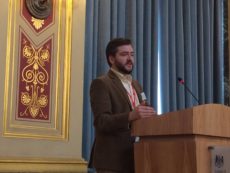 While defending the human right to freedom of religion or belief, Andrew Copson, Chief Executive of the British Humanist Association, also offered a few words of caution, speaking at the Conference on Preventing Violent Extremism by building inclusive and plural societies: How Freedom of Religion or Belief can help, at the Foreign and Commonwealth Office.
While defending the human right to freedom of religion or belief, Andrew Copson, Chief Executive of the British Humanist Association, also offered a few words of caution, speaking at the Conference on Preventing Violent Extremism by building inclusive and plural societies: How Freedom of Religion or Belief can help, at the Foreign and Commonwealth Office.
‘Let’s not be naive about freedom of religion or belief,’ he said. ‘Any concept is susceptible to distortion. There are deviations from the concept of democracy that only superficially resemble democracy, there are debased forms of secularism and science and so on. This field is not immune.’
The conference at the Foreign Office was held to share best practice approaches to Freedom of Religion and Belief (FoRB) and aimed to bring together a wide range of individuals to share ideas, identify opportunities for working together in pursuit of solutions, demonstrate the UK’s commitment to working on FoRB, and raise awareness of the current state of freedom of religion or belief across the world.
Copson recalled that the outgoing UN Special Rapporteur on Freedom of Religion or Belief, Heiner Bielefeldt, had warned that ‘the term “freedom of religion or belief” was only a kind of shorthand. The full human right was “freedom of thought, conscience, religion or belief.”’
The UN Special Rapporteur had gone on to say: ‘In all my reports (country-specific or thematic) I quote General Comment no. 22 which clarifies that article 18 of the ICCPR [International Covenant on Civil and Political Rights] protects theistic, non-theistic and atheistic beliefs as well as the right not to profess any religion or belief.
‘Formulations such as “religious freedom” obfuscate the scope of this human right which covers the identity-shaping, profound convictions and conviction-based practices of human beings broadly.’
Talking to conference, Copson said that we were diminishing the scope of this human right by leaving out “freedom of thought” and “conscience”. And that further redaction to “religious freedom” – while sometimes it may come from a simple desire for brevity – was particularly egregious.
It had led to a kind of “religious freedom” as demand, wherein the right to “religious freedom” was elevated to privilege over others, or privilege for particular groups, a demand of “group rights” (as opposed to individual rights). This debased form of FORB, the “religious freedom” as privilege, was not supported by the human rights framework, and threatened the upholding of the rights of others, he added.
‘I think this has particular relevance at the current time, when many countries are demographically secularizing, and debates about the demands that can be mandated by “religious freedom” frequently make headline news. Indeed the United States is one of the countries where this contrast between FORB-as-human-right and “religious freedom” as privilege is most stark.
‘The constitutional protection of religious liberty in the US constitution is largely very clear and very close to the modern FORB-as-human-right. And yet “religious freedom” is widely and mistakenly being used as an excuse to demand privileges, to deny services, or to discriminate (usually against women and sexual minorities, sometimes against children, against the non-religious, or along racial lines).
‘I do not ask for agreement on every debate around the domain of “freedom of religion or belief”, but I do hope there is a recognition of the existence of a debased form of FORB, which fails to uphold non-discrimination and fails to respect the rights of others,’ said Copson.
‘I believe we should all encourage our national governments to recognise the debased form of “religious freedom” that demands privileges and inflicts discrimination, and to disown it; and instead to uphold FORB – more properly: the freedom of thought, conscience, religion or belief – as one human right, which can be consistently upheld for all.’
